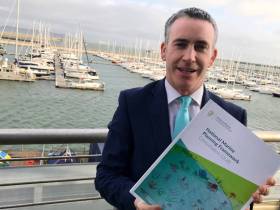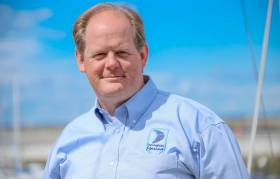Displaying items by tag: Marine Planning Policy Statement
‘Critical That We Provide Framework’ For Marine Planning Says Minister At Launch Of Draft Consultation
Sixteen different sectors and activities are within the scope of the draft National Marine Planning Framework (NMPF) launched yesterday (Tuesday 12 November).
And plans for a system of designated Strategic Marine Activity Zones among its main ambitions, as previously reported on Afloat.ie.
Commenting on the draft, Damien English, Minister of State for Housing and Urban Development, said: “Our ocean supports a diverse range of economic activities such as seafood, tourism, renewable ocean energy and a wide range of recreational opportunities.
“It contains areas with some of the most productive and diverse resources in the world. Its ecosystem and biodiversity make it an environmental and social treasure.
“As our marine and coastal areas experience more pressures from human activity it is critical that we provide a framework for what activities should and shouldn’t happen in our marine and coastal areas.”
The minister notes that a component of the draft NMPF is its policies relating to renewable energy and action on climate change.
He said: “Climate change is the defining challenge of our generation. The Government’s Climate Action Plan, published in June, highlighted the critical role of marine planning for the delivery of offshore renewable energy. This document sets out the proposed forward-planning framework within which our renewable energy targets can be met.”
The Climate Action Plan commits to increasing the level of electricity generated from renewable sources to 70%, indicatively including at least 3.5GW of offshore renewable energy.
In addition, the draft NMPF reinforces the Government’s stated commitment to move away from oil combustion within heat and transport sectors towards renewables in the coming decade.
Minister English also launched the Government’s new Marine Planning Policy Statement, which was subject to public consultation this past summer and outlines the Government’s vision for the future development of the marine planning system.
It also sets out the overarching policies and principles the Government says it expects marine planning bodies, and other public bodies that engage with the marine planning system, to observe.
Just as the NMPF will be a parallel document to the National Planning Framework, the Marine Planning Policy Statement is a parallel document to the Planning Policy Statement, which underpins the operation of Ireland’s entire land-planning system.
The minister has invited the public and all interested parties to give their views on the draft framework.
“The document we’re publishing is the culmination of two years of engagement and dialogue with the public and stakeholders and across Government,” he said.
“The very constructive engagement with the NMPF Baseline Report, published last year, has had a major influence on this document. Whether you are in the energy sector, a fisherman, want to protect our marine environment, or live in a coastal community and are concerned about your area’s future, please have your say before February 28th.
“We want the finalised plan to be national in every sense — valued, owned and supported by all. Strong public input will help achieve that.”
The National Marine Planning Framework Consultation Draft is available to read or download HERE.
Irish Marine Federation Welcomes Public Consultation On Draft Marine Planning Policy Statement
Feedback from the public and interested stakeholders is being sought on the Government’s Marine Planning Policy Statement by Friday 9 August.
The statement sets out efforts to bring marine planning “into the mainstream of Government functions” as issues surrounding land use, climate change and more come into greater focus.
Earlier this year, it was reported that more than half of submissions in the public consultation on the National Marine Planning Framework Baseline Report concerned the marine environment.
In its own submission, the Irish Marine Federation said barriers to investment and sustainability around the Irish coastline have for “took long stymied growth in the marine sphere”.
The trade body’s chair Paal Janson says its members voices are being heard at regular meetings with Minister of State Damien English in The Custom House, and he looks forward to incorporating feedback from its members on the policy statement consultation draft, which is attached below.































































